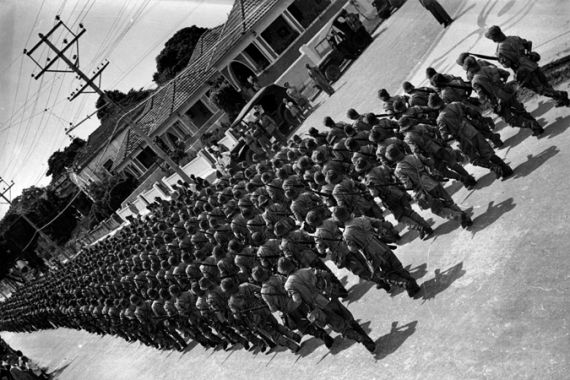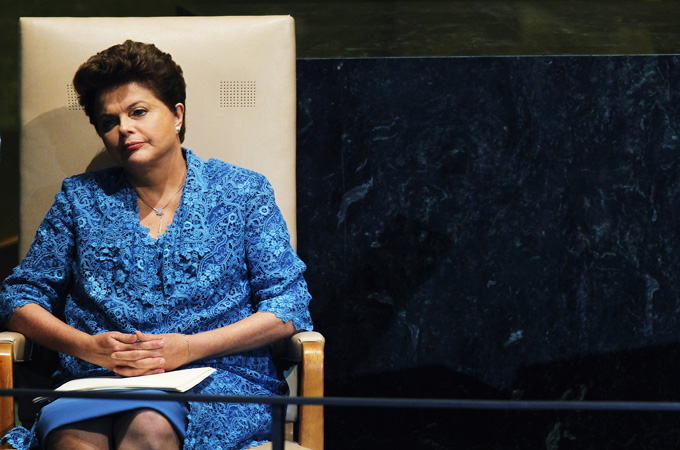Building truth in Brazil
Brazil President Rousseff has created a commission to unveil crimes committed during the country’s military regime.

 |
| Rousseff, herself a victim of torture, has organised a Truth Commission to unveil past crimes [GALLO/GETTY] |
Some things take time. Dilma Rousseff, once a political prisoner who survived repeated torture at the hands of the military dictatorship, is now, a quarter of a century later, Brazil’s commander-in-chief. President Rousseff, Brazil’s first female head of state, pushed forward the creation of a Truth Commission to unveil crimes committed during the country’s military regime.
She is about to announce the seven appointed members comprising the commission who will have access to all archives and can subpoena any witness. This commission is an enormous achievement. As we celebrate the long-overdue investigation into past crimes, we must also consolidate justice for the crimes of the present.
At last, Brazil’s Truth Commission
After 17 years of presidents who were victims of the military regime (Cardoso was exiled, Lula jailed and Rousseff tortured), Brazil has finally signed into law a National Truth Commission for crimes committed between 1946 and 1988. The period includes more than two decades of military regimes. Brazil’s dictatorship was far less violent than others in the region, but lasted longer.
Between 1964 and 1985, an estimated 475 people were forcibly disappeared, 50,000 imprisoned, and at least 20,000 tortured. In practice, the commission entails the analysis of cases of torture, death and forced disappearances and the search for their bodies – in Brazil and abroad – since Operation Condor was orchestrated across the region by the dictatorships of Chile, Argentina, Uruguay, Paraguay and Brazil. Though the numbers are relatively low (Argentina, for example, counts the numbers of disappeared in the tens of thousands), Brazil is the last country in the region once ruled by a major dictatorship to finally establish any kind of truth commission.
The search for justice has been in the works for a while. President Cardoso formally apologised for crimes committed under the military regime in 1995, granting compensation to the victims and their families. In 2003, the Supreme Court ordered all archives regarding the Araguaia campaign against rural guerrilla forces to be opened. When President Lula overturned this decision, the case was taken to the Inter-American Court of Human Rights. The international court recently condemned Brazil, declaring the Amnesty Law of 1979 incompatible with the Inter-American Convention on Human Rights and urging the government to provide victims the right to memory – as well as to justice and reparations.
Since Lula’s 2009 national human rights programme, pressure from the military progressively succeeded in watering down the Truth Commission’s mandate. The military expressed reluctance towards a process they say will unnecessarily re-open old wounds. In fact, they have been actively resisting a process that will undermine the Amnesty Law, a blanket amnesty that pushed into oblivion crimes committed during the dictatorship.
Although they ultimately could not block the commission’s establishment, now urged by international courts, the military was able to create a “plural commission” with the appointment of military judges, and did succeed in making certain that those found responsible for human rights violations would not face criminal prosecution.
Truth without justice?
The commission is not designed to make justice. It is a Truth Commission equipped solely to unveil crimes, shedding light on what really happened during those dark years. Its purpose is to construct memory. It is an effort to establish an official history, not to punish.
Rousseff’s message to the country stressed how fundamental it is, especially for the younger generations, to know the truth about our past – so that the acts that stain our history can never happen again.
| Read more from Manuela Picq: |
|
|
The families of the victims, however, want justice. They want to bury their dead and restore memory, but they also want the perpetrators to be held accountable. Without the legal authority to establish criminal responsibility, activists argue, the commission cannot bring justice. Families remain largely dissatisfied with multiple government concessions, decrying its legal limitations, some even rejecting the commission’s legitimacy.
Nevertheless, the commission will have a significant symbolic impact. So why is the military nervous? Perhaps the commission marks a point of no return. The families of the victims have been battling for too long not to try using the truth established in one court to seek justice in another. Moreover, as the truth comes out, changing the official history and making us more aware of what happened, the torch of memory will pass from individual victims to society – which may mobilise for justice too.
Latin America’s many Truth Commissions
The Americas alone have produced nine out of 22 Truth Commissions created worldwide in the past 12 years. By now, most Latin American countries have implemented some form of transitional justice mechanism, making such commissions the norm rather than the exception.
Truth Commissions were established for different purposes and have produced varying outcomes. Argentina pursued a judicial path holding individuals responsible. Chile focused on political crimes committed during the dictatorship, recognising the importance of human rights in the transition to democracy. In Peru and Guatemala, Truth Commissions generated estimates of the number of victims and massacres, examining violence that was more widespread and included strong ethnic and economic factors (around 70 per cent of victims in Peru, and about 80 per cent in Guatemala, were indigenous peoples). El Salvador’s report was followed by a blanket amnesty within days, whereas Uruguay’s commission was acclaimed for its rigour.
Truth Commissions are not above politics, but rather inextricably enmeshed in it, requiring compromise. Prior experiences inevitably reveal the tensions between justice and reconciliation. Going last will at least give Brazil the benefit of learning from the mistakes of others.
Democracy by fits and starts
Brazil’s commission probably will not have a transformative impact, nor is it intended to foster political transition, reconciliation or peace-building. Instead, it comes at a time when a solid democracy already exists, and can contribute to deepening a public ethos of accountability and citizenship.
The military dictatorship exercised violence against political prisoners, but it did not invent nor inaugurate violence. It democratised a culture of violence that had long been perpetrated against the poor and powerless, extending it to its political enemies among the middle classes and economic elite. State violence continued after democratisation, exercised by the police instead of the armed forces. The levels of police brutality in Brazil remain staggering. Victims are mostly poor and black, living in slums. They are tortured and killed because of their race, geography and lack of opportunity, not their political ideals.
The creation of the commission coincides with ongoing reforms in public security. In Rio de Janeiro, the “pacifying” police units deployed in the slums that use innovative partnerships with civil society groups to counter violence are so successful that they will be used as a national model. The commission’s work to reconstruct a public memory of the past will truly be significant if it signals the end of impunity and police violence in the present. We owe justice to past political victims of the military dictatorship but also to the other victims of the democratic present.
Latin America is as diverse as it is complex. While some governments are busy cracking down on their opposition, others are apologising for their violent pasts. While Brazil stands among the most vibrant democracies in the world, it is still among the most unequal.
Rousseff inspired Brazilians with her resilience, demonstrating as the first female president of Brazil that the corridors of power are growing more accessible, and as a survivor of torture, exemplifying the possibility of outlasting our oppressors to bring democratic transitions to completion. It remains to be seen whether Brazilian democracy will find the inspiration and resilience to extend the same possibilities of truth and justice to today’s victims of poverty, inequality and a deeply ingrained culture of impunity.
Manuela Picq has just completed a position as a visiting professor and research fellow at Amherst College. She is currently writing a book on indigenous peoples’ rights in the Amazon.
The views expressed in this article are the author’s own and do not necessarily represent Al Jazeera’s editorial policy.

